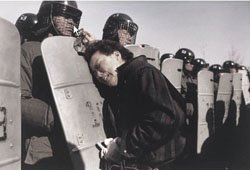Levon Ter-Petrosyan’s Interview to the A1+ News Agency
Mr. President, in your speech on 17 October you had promised always to keep the society informed about the developments concerning the resolution of the Karabagh conflict. Would it be correct to regard the meeting between the presidents of Russia, Armenia, and Azerbaijan – Medvedev, Sargsyan, and Aliyev – as one such development?
First, I have not forgotten my promise. Moreover, in order to make our conversation more grounded, I would like to remind the readers the appropriate excerpt of the speech: “We are going to witness developments of utmost importance regarding the resolution of the Karabagh conflict in the upcoming several months, which at this stage make our domestic problems secondary. We are going to follow these developments carefully, to assess the adequacy of the steps taken by the Armenian authorities in response to the situation, always to keep the society informed about the process of resolving the Karabagh conflict, and to thwart or minimize the threats to the interests of the Armenian side.” As for your question, the Moscow declaration should definitely be considered as one of the most important developments in the process.
Some people have gotten the impression that the declaration is more of a formality and that it is devoid of any real content.
Only people unfamiliar with the details of the process of resolving the Karabagh conflict can form such an erroneous impression. For experts it is just the opposite - a very telling document, because it clarifies several principal and specific issues. We should also realize that the document is just the tip of the iceberg, and that it has a very comprehensive base, the content of which is not difficult to guess.
Which are the principal and specific issues you referred to?
The very first article of the declaration contains a worrisome formulation, according to which “the conflict in Karabagh will be resolved according to the principles and norms of international law, as well as the decisions and documents adopted on their basis.” It is not the platitude about the “principles and norms of international law” that is the source of concern here, but the mention of the “decisions and documents adopted on its basis.” The latter presupposes, undoubtedly in response to Azerbaijani demands, the Resolution 62/243 of the General Assembly of the UN and the Resolution 1614 of the Parliamentary Assembly of the European Council, which recognize Azerbaijan’s territorial integrity and demand the withdrawal of Armenian forces from Azerbaijani territories adjacent to Karabagh.
The second article of the Moscow declaration states unequivocally, that the Madrid proposal submitted by the co-chairmen of the Minsk Group on 29 November, 2007, will form the basis of the resolution of the Karabagh conflict. Since I have discussed the content of that proposal in detail in my 17 October speech, I am not going to talk about it now. I would like to remind only that the harmonization of the two [relevant] principles of international law – the sanctity of territorial integrity and the right to self determination – is the essence of that proposal.
The preamble and article 4 of the declaration talk about the resolution of the Karabagh conflict through the ongoing direct dialogue between Armenia and Azerbaijan, which in essence defines a new format regarding the parties to the conflict. The declaration thus buries once and for all the resolution adopted during the Budapest summit of 1994, which had recognized Nagorno-Karabagh as a full, third party to the conflict with all the appropriate rights. This means that Karabagh is going to have no role in the subsequent negotiations that are going to decide its fate.
The fact that the two conflicting parties – Armenia and Azerbaijan –have essentially given their consent to the Madrid principles, must, nonetheless, be considered the most important result of the Moscow declaration, which is an unprecedented event in the entire process of [negotiations] to resolve the Karabagh conflict. The problem is that the three previous proposals of the Minsk Group co-chairmen – the “phased plan,” the package deal,” and the idea of a “common state” - have not received the approval of the conflicting parties, and have therefore been taken out of the agenda. Both the “phased plan” and the “package deal” were rejected by Karabagh, while the “common state” idea was rejected by Azerbaijan. The signatures of Serge Sargsyan and Ilham Aliyev on the Moscow declaration signify the beginning to the final phase of the resolution of the Karabagh conflict.
Didn’t you forget the Key West proposal?
The Key West proposal was not an official proposal of the co-chairmen of the Minsk Group. But regardless, that proposal also was not accepted by one of the parties – Azerbaijan.
Doesn’t the Russian initiative contradict the opinion expressed in your latest speech that the decisive role in resolving the Karabagh conflict will be played by the West?
Not at all. Even though the meeting in Moscow is a turning point, it is just the beginning of the process. The process now continues in Europe, and it will in all likelihood end in the United States in December. In other words, even though the apparent honor of opening the process has been granted to Russia, the sole power of ending it will belong to the West. Both Sargsyan and Aliev have participated in the Moscow meeting if not under duress, then with poorly veiled reluctance. Despite the differences in their reasons, they both are going to prefer the West’s mediation.
What role will be granted to the Minsk Group, which, the declaration insists, should continue to exists and operate?
The more the role of the Minsk Group is emphasized and the more compliments are made in its address the deeper the suspicions about disagreements inside it become. Despite being a useful instrument, it is basically a diplomatic cover for achieving the aims of the mediator countries.
skip to main |
skip to sidebar



La police d'émeute et une mère aprés que son fils ait été arrêté à la démonstration accusant le gouvernement de la fraude dans les élections présidentielles. Corée 1978. Anthony Suau

Tiananmen 1989

Election - Ընտրություններ /// Twitter / himaarmenia
Վերջին նորություններ
liens / կայքեր
- e-Channel
- ՀՀ քաղաքական բանտարկյալների եւ հալածյալների պաշտպանության կոմիտե
- Ծիծեռնակ
- massisweekly.com
- hima.blogspot.com
- armenianow.com
- hetq.am
- infoarmenia.org
- ditord.wordpress.com
- payqar.net
- eurasianet /armenia: vote 2008
- Photos - NYT
- yevrobatsi.org
- a1plus.am
- aravot.am
- armenaker.blog
- martimek.livejournal.com
PETITION
ՀԱՅՏԱՐԱՐՈՒԹՅՈՒՆԵՐ DECLARATIONS

Comité SDA - հայ - fr
Human Rights Watch - eng
Lettre de femmes et mères- fr
Հավատացեալները ԱՀ Կաթողիկոսին - հայ
NGOs Arménie -eng
Policy Forum Armenia - eng
Lettre au Secrétaire Général de l'OSCE (Allemagne) - de
Pétition à l'ONU - eng
Groupe parlementaire Suisse-Arménie - fr
Conseil National Arménien - fr
Sos Armenia (Georgie) - eng
MCC à R. Kocharian - eng
Sos NGOs Arménie - eng
Parti Conservative - eng
To Aremenians of America - eng
Human Rights Watch - eng
Lettre de femmes et mères- fr
Հավատացեալները ԱՀ Կաթողիկոսին - հայ
NGOs Arménie -eng
Policy Forum Armenia - eng
Lettre au Secrétaire Général de l'OSCE (Allemagne) - de
Pétition à l'ONU - eng
Groupe parlementaire Suisse-Arménie - fr
Conseil National Arménien - fr
Sos Armenia (Georgie) - eng
MCC à R. Kocharian - eng
Sos NGOs Arménie - eng
Parti Conservative - eng
To Aremenians of America - eng
"JAMANAK" et "PAIQAR" EN PDF
Global Voices Online

HISTOIRE / ՊԱՏՄՈՒԹՅՈՒՆԻՑ

La police d'émeute et une mère aprés que son fils ait été arrêté à la démonstration accusant le gouvernement de la fraude dans les élections présidentielles. Corée 1978. Anthony Suau
"Առաջ Հայաստան"...

Tiananmen 1989
ընդամենը
այցելում




